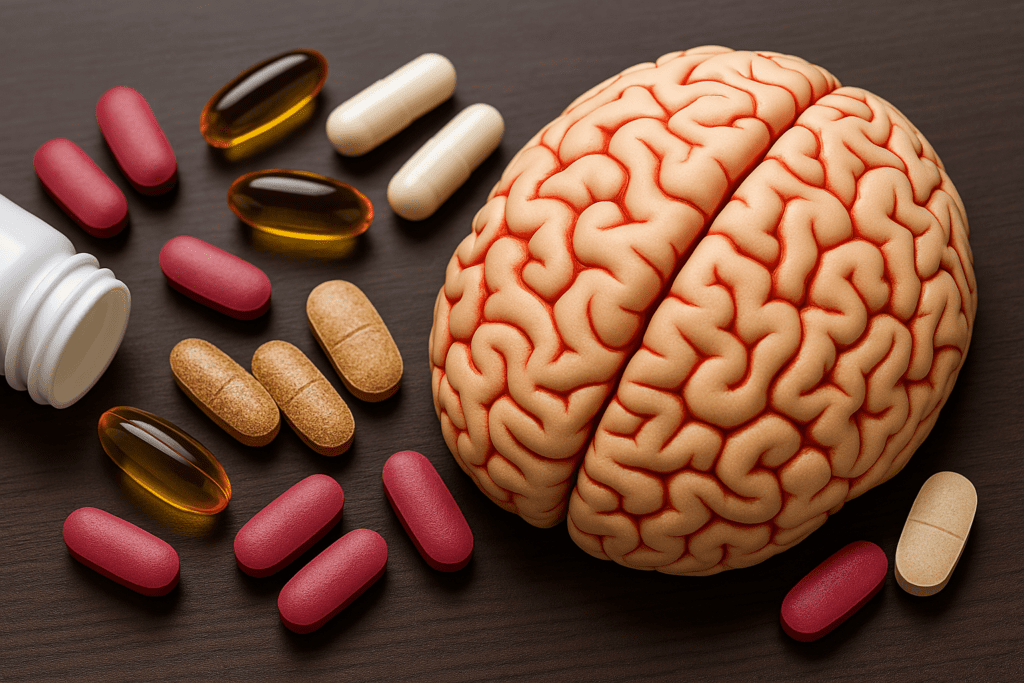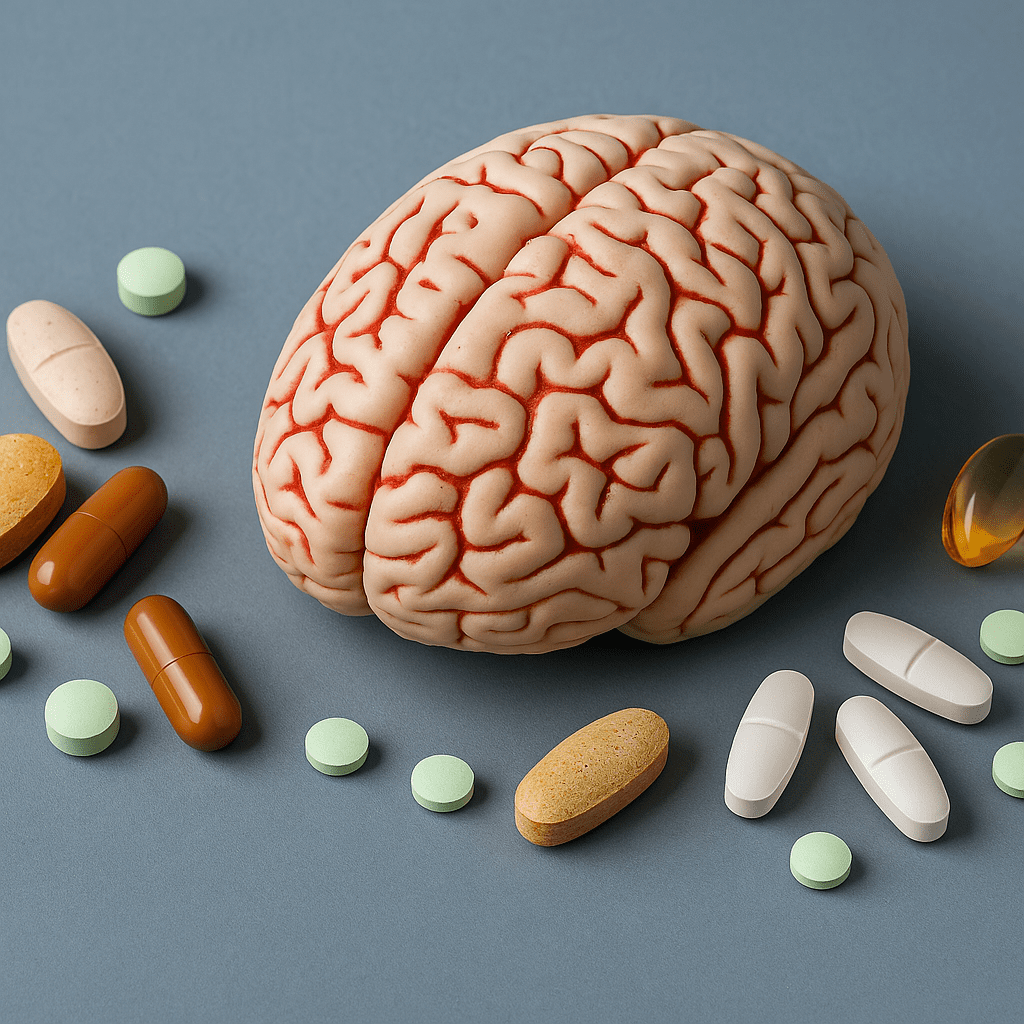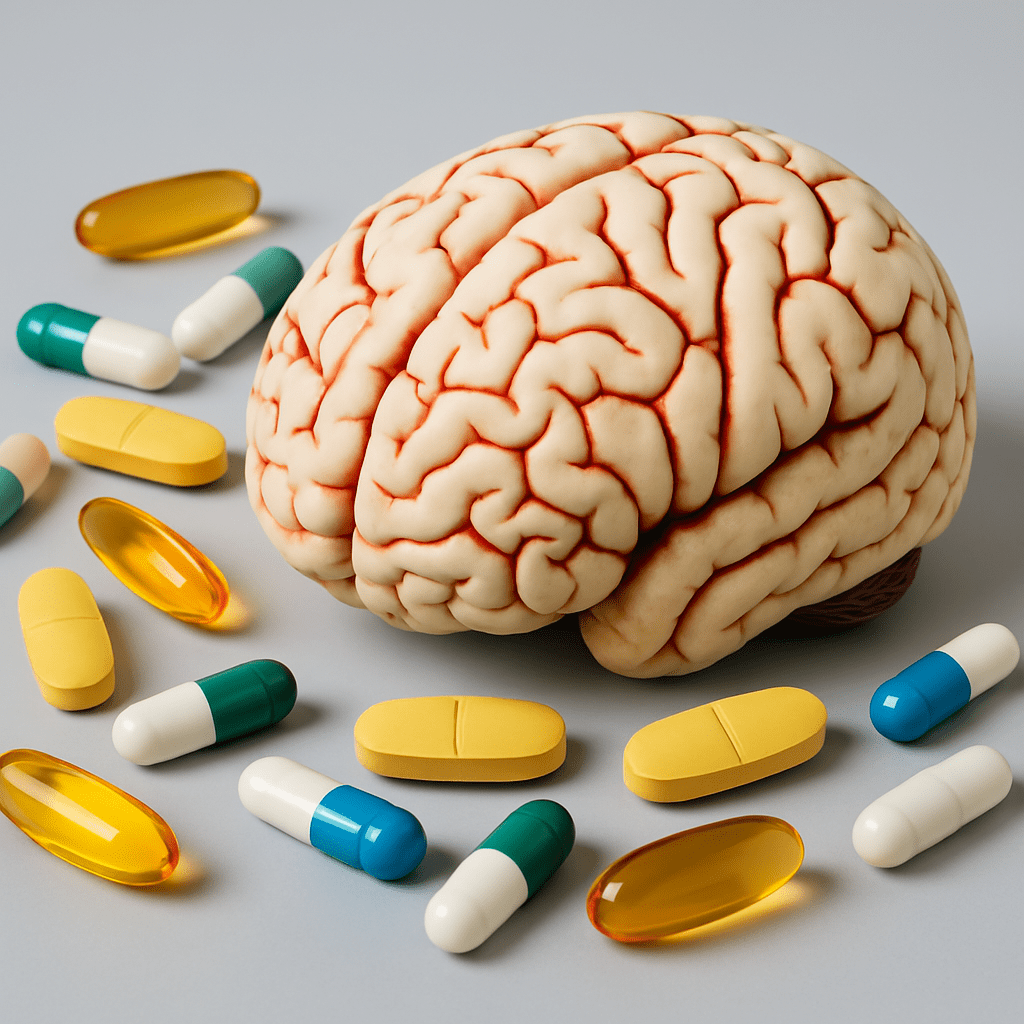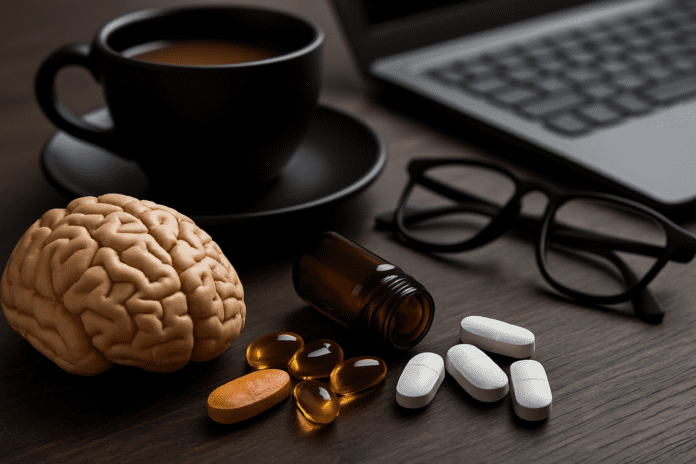Introduction: The Pursuit of Mental Clarity in a Distracted World
In our fast-paced, hyperconnected society, the quest for sustained attention and peak mental performance has never been more urgent. Whether it’s the demands of modern work culture, academic pressure, or the mental fatigue of daily decision-making, cognitive clarity often seems elusive. As more people seek safe and effective ways to enhance focus and fight fatigue, a growing number are turning to over-the-counter (OTC) solutions. This article explores the science behind OTC stimulants for energy and cognitive function, offering a detailed guide for those considering over-the-counter focus meds or looking to better understand their impact on brain health and long-term well-being.
You may also like: How to Improve Focus and Concentration: Proven Techniques for Boosting Mental Clarity and Productivity
Understanding Mental Fatigue and the Demand for Cognitive Enhancement
Mental fatigue is not merely the byproduct of a long day—it is a physiological response triggered by sustained cognitive effort, lack of sleep, poor nutrition, or chronic stress. Over time, it diminishes mental agility, weakens memory, and impairs decision-making. The widespread nature of this phenomenon is evidenced by the surge in products designed to combat it, particularly those marketed as OTC focus meds or stimulants for mental and physical energy. The demand for these products reflects a broader societal need: the desire to sharpen mental acuity without the side effects or complexities of prescription medications. As the public seeks accessible and non-prescription pathways to boost productivity, the importance of understanding the mechanisms, benefits, and limitations of these products becomes increasingly vital.
How OTC Stimulants for Energy Work in the Brain
Most OTC stimulants for energy operate by influencing key neurotransmitters—chemical messengers in the brain that regulate alertness, motivation, and focus. Ingredients like caffeine, L-theanine, and B vitamins are commonly found in these products, each playing a unique role in neurochemical balance. Caffeine, for instance, blocks adenosine receptors, reducing the sensation of fatigue and enhancing dopamine signaling. When paired with L-theanine, a calming amino acid derived from tea leaves, the result is often a smoother, more sustained form of alertness. Meanwhile, B-complex vitamins are critical for energy metabolism in brain cells, helping to maintain the integrity of neurological functions. These ingredients form the core of many over-the-counter focus meds and are valued for their ability to increase wakefulness and improve mental performance with relatively low risk when used properly.

Popular Ingredients Found in OTC Focus Meds and Their Effects
Caffeine is undeniably the most recognized and widely used ingredient in OTC stimulants for energy. Its effectiveness lies in its rapid onset and consistent impact on attention and physical stamina. However, not all focus-enhancing ingredients rely solely on stimulation. Adaptogens like Rhodiola rosea and ginseng are also frequently included for their capacity to enhance the body’s resistance to stress and reduce cognitive fatigue over time. Amino acids such as L-tyrosine, which supports the production of dopamine and norepinephrine, may improve cognitive performance during periods of sleep deprivation or intense mental exertion. Additionally, compounds like citicoline and alpha-GPC support memory and attention by boosting levels of acetylcholine, a neurotransmitter essential to learning and cognition. These formulations, often featured in OTC focus meds, are carefully designed to offer both immediate and long-term support for mental clarity.
Evaluating the Safety and Efficacy of OTC Cognitive Enhancers
One of the most important considerations when exploring OTC focus meds is the balance between efficacy and safety. While many of these products contain ingredients with well-documented benefits, individual responses can vary significantly. Factors such as baseline nutritional status, genetics, sensitivity to stimulants, and pre-existing health conditions can influence how a person reacts to these supplements. Furthermore, the regulatory environment for dietary supplements in many countries, including the United States, is less stringent than that for prescription medications. This means consumers must exercise discernment and prioritize products that are third-party tested, transparently labeled, and backed by scientific evidence. Long-term safety also remains an area of active investigation, particularly for newer or less-studied compounds. Choosing products with a strong evidence base and a track record of safe use is critical to avoiding unintended side effects and achieving optimal results.
OTC Stimulants for Energy vs. Prescription Medications: Key Differences
While OTC stimulants for energy may appear similar in purpose to prescription stimulants like Adderall or Modafinil, they differ significantly in their mechanisms and potency. Prescription stimulants are typically reserved for diagnosed conditions such as attention deficit hyperactivity disorder (ADHD) or narcolepsy, and they carry a higher risk of dependency and side effects. In contrast, OTC focus meds are generally milder, working through a more subtle modulation of neurotransmitter systems. Their effects are often described as enhancing rather than altering cognition, providing a cognitive edge without dramatically changing brain chemistry. For many users, especially those without clinical cognitive deficits, this makes OTC solutions a more appealing and sustainable option. However, it’s important not to conflate accessibility with safety—responsible use and realistic expectations are essential when incorporating these products into a daily routine.
When and How to Use OTC Focus Meds Responsibly
Incorporating OTC focus meds into your routine should be approached with intention and awareness. Timing, dosage, and individual needs all play a role in determining efficacy. For example, using a caffeine-based supplement too late in the day can disrupt sleep cycles and contribute to long-term fatigue rather than alleviating it. Likewise, stacking multiple stimulants may amplify alertness in the short term but could also lead to overstimulation, jitteriness, or anxiety. Ideally, these products should be used in contexts that require sustained attention—such as studying, writing, or managing complex tasks—and paired with healthy lifestyle habits like hydration, regular meals, and sufficient rest. Taking breaks between usage periods, often referred to as cycling, can help prevent tolerance buildup and preserve sensitivity to active ingredients. Understanding when and how to use OTC stimulants for energy can empower users to harness their benefits without compromising overall health.
Supporting Long-Term Brain Health Beyond OTC Solutions
While OTC focus meds can offer meaningful short-term improvements in energy and cognition, they should not replace foundational health practices that support long-term brain vitality. Nutrition, physical activity, sleep hygiene, and stress management remain the cornerstones of cognitive health and anti-aging strategies. Diets rich in omega-3 fatty acids, antioxidants, and anti-inflammatory compounds have been shown to protect against neurodegeneration and cognitive decline. Regular aerobic exercise enhances neuroplasticity and supports the growth of new brain cells, particularly in regions associated with memory and learning. High-quality sleep allows for essential processes like memory consolidation and toxin clearance via the glymphatic system. Chronic stress, on the other hand, can shrink key brain areas and impair function over time. Integrating these lifestyle strategies with the responsible use of OTC stimulants for energy creates a comprehensive and sustainable approach to brain health.
Who Should Avoid OTC Focus Meds and Why
Although generally regarded as safe when used appropriately, OTC focus meds are not suitable for everyone. Individuals with cardiovascular conditions, anxiety disorders, or a history of stimulant sensitivity should consult a healthcare provider before using any product that affects neurotransmitter systems. Pregnant or breastfeeding individuals, as well as children and adolescents, should also avoid these products unless explicitly advised by a medical professional. Certain ingredients may interact with prescription medications, including antidepressants, blood pressure drugs, or anticoagulants. In these cases, even natural substances like ginseng or L-tyrosine can pose risks. It is essential to consider one’s full medical history and current health status before introducing any new supplement regimen. Personalized medical advice and a cautious, informed approach are crucial to avoiding adverse effects and ensuring that cognitive enhancement efforts support, rather than compromise, long-term health.
The Future of OTC Focus Meds and Cognitive Enhancement
As research into nootropics and cognitive enhancement continues to advance, the future of OTC focus meds looks increasingly promising. Emerging compounds like noopept, phenylpiracetam, and adaptogenic mushrooms are gaining attention for their potential to improve memory, focus, and resilience to mental stress. Advances in nutrigenomics—the study of how genes interact with nutrients—may soon allow for personalized supplement recommendations based on individual genetic profiles. Additionally, growing consumer demand is likely to drive improved regulation and higher standards of safety and efficacy. Transparency in labeling, clinical validation, and third-party testing are becoming the norm rather than the exception. As public interest evolves from mere productivity to holistic cognitive wellness, the best OTC energy stimulants will likely combine performance-enhancing ingredients with compounds that support long-term brain health.

Frequently Asked Questions: Safe Use of OTC Stimulants for Energy and Over-the-Counter Focus Meds
1. What are some advanced strategies for maximizing the benefits of OTC focus meds without developing a dependency?
To gain the most from OTC focus meds while avoiding dependency, it’s essential to integrate a structured approach that leverages both physiological and behavioral strategies. One technique involves timing the use of these aids around your natural circadian rhythm. For example, using OTC stimulants for energy earlier in the day aligns with your body’s peak cortisol production, minimizing sleep disruptions while still enhancing alertness. Another strategy is microdosing—using the lowest effective amount of a focus-enhancing compound rather than the full recommended dose. This can reduce tolerance development and preserve the medication’s long-term efficacy. Incorporating cognitive training exercises, such as working memory drills or mindfulness-based stress reduction, can further amplify the benefits of over-the-counter focus meds by improving baseline cognitive capacity. Rotating between different types of OTC focus meds every few weeks may also prevent overstimulation of specific neurotransmitter pathways, reducing the risk of desensitization. Most importantly, regular reassessment of cognitive goals and supplement effectiveness should guide continued use. This way, the relationship with these tools remains intentional and benefit-driven.
2. Can OTC stimulants for energy impact creativity, or are they only useful for analytical tasks?
While OTC stimulants for energy are commonly associated with improved focus, they can also influence creative thinking in nuanced ways. Enhanced dopamine activity, often triggered by ingredients like L-tyrosine and caffeine, can increase cognitive flexibility—a core element of creativity. However, the effect is not universal. For individuals with naturally high dopaminergic tone, increased stimulation from over-the-counter focus meds may actually inhibit the divergent thinking needed for creative work. The environment also matters: when these meds are used in high-pressure, structured settings, they tend to promote linear thinking, which is ideal for analysis but may constrain imagination. In contrast, low-dose usage in relaxed environments can enhance idea generation by reducing mental fatigue and sustaining ideational flow. Integrating periods of unstructured exploration after using OTC focus meds—such as journaling, free sketching, or brainstorming—can help channel the improved concentration into original outputs. Thus, while they may not directly spark creativity, these stimulants can support the mental endurance needed to nurture and execute creative ideas more effectively.
3. How can one differentiate between high-quality OTC focus meds and lower-grade products on the market?
Discerning quality in OTC focus meds requires attention to sourcing, transparency, and formulation integrity. High-quality brands provide third-party lab testing results, offering assurance that the product contains the claimed ingredients in accurate dosages and is free from contaminants. Transparent labeling is another hallmark of reputable over-the-counter focus meds—every active compound should be listed with its exact amount, not hidden behind proprietary blends. The inclusion of bioavailable forms of nutrients, such as methylcobalamin instead of cyanocobalamin for vitamin B12, indicates a product designed with absorption and efficacy in mind. Another indicator is clinical backing; quality OTC stimulants for energy often cite peer-reviewed studies supporting the use of their key ingredients. Reputable brands also avoid excessive fillers and artificial dyes, choosing instead to prioritize synergistic combinations that enhance both safety and performance. Lastly, customer reviews and endorsements by integrative health professionals can offer practical insight into how well a product performs under real-world conditions, adding another layer of trust.
4. What role do genetics play in the effectiveness of over-the-counter focus meds?
Genetic variability is an often overlooked but crucial factor in determining how individuals respond to over-the-counter focus meds. Variations in genes like COMT (catechol-O-methyltransferase), which regulate dopamine metabolism, can influence whether someone thrives or struggles with the stimulatory effects of OTC stimulants for energy. Individuals with the “warrior” COMT genotype may metabolize dopamine more efficiently, making them more resilient to stress but possibly less responsive to mild stimulants. Conversely, those with the “worrier” variant might experience heightened sensitivity to stimulation and benefit more from lower doses. Another important gene, CYP1A2, affects caffeine metabolism; fast metabolizers may tolerate and benefit from caffeine-based OTC focus meds, while slow metabolizers could experience anxiety or jitteriness even at standard doses. As the field of personalized nutrition and nootropic science evolves, DNA-based supplement recommendations are becoming increasingly feasible. This personalized approach can help match users with the most suitable over-the-counter focus meds, enhancing benefits while minimizing side effects. Understanding your genetic makeup provides a powerful tool in tailoring cognitive enhancement strategies to individual needs.
5. Are there effective OTC stimulants for energy that do not rely on caffeine or other central nervous system stimulants?
Absolutely—there are several effective OTC stimulants for energy that operate through non-caffeinated pathways, offering focus and vitality without overstimulating the central nervous system. Adaptogens like Rhodiola rosea and ashwagandha support energy production by modulating the body’s stress response and improving mitochondrial efficiency. These herbs can enhance resilience to mental fatigue and maintain stamina over longer periods. Acetyl-L-carnitine is another example; it supports mitochondrial function in brain cells, thereby improving energy metabolism and cognitive clarity without inducing jitteriness. Similarly, B-vitamin complexes, particularly when combined with magnesium and zinc, play critical roles in the synthesis of neurotransmitters and the maintenance of cellular energy. These nutrient-based over-the-counter focus meds are especially appealing for individuals who are sensitive to traditional stimulants or want to avoid potential withdrawal effects. By targeting energy production at the cellular level, these compounds offer a more balanced and sustainable form of mental enhancement.
6. How do OTC focus meds interact with meditation, breathwork, or other cognitive-enhancing practices?
When thoughtfully integrated, OTC focus meds can amplify the effects of mindfulness-based cognitive enhancement practices such as meditation and breathwork. Certain over-the-counter focus meds, particularly those with L-theanine, help calm the mind without reducing alertness, creating an ideal neurochemical environment for deep meditative states. In combination with paced breathing or heart rate variability training, these supplements may increase parasympathetic activity, promoting both mental clarity and emotional regulation. Additionally, compounds that enhance alpha brainwave activity can make it easier to enter flow states during practices like yoga nidra or transcendental meditation. Some users report that OTC stimulants for energy improve post-meditation recall and concentration, allowing them to apply insights from mindfulness practices more effectively in daily life. However, it’s essential to use these aids as a complement—not a crutch—for cognitive training. Over time, consistent use alongside these techniques may facilitate neuroplastic changes, making both the meditative state and its cognitive benefits more accessible even without supplementation.
7. What are the long-term neurobiological implications of regular OTC stimulant use?
Long-term use of OTC stimulants for energy may lead to adaptive changes in neurotransmitter systems, particularly if high doses are used frequently without cycling or nutritional support. For instance, sustained elevation of dopamine from stimulant use can lead to downregulation of dopamine receptors, potentially reducing baseline motivation or enjoyment from everyday tasks. Some individuals may experience a gradual blunting of natural energy cycles, leading to reliance on external stimulation to initiate or sustain focus. On a more optimistic note, certain over-the-counter focus meds—especially those incorporating neuroprotective compounds like citicoline or Bacopa monnieri—may promote long-term brain health by supporting membrane fluidity, reducing oxidative stress, and enhancing neurogenesis. The net impact depends on both the ingredients and the usage pattern. Responsible use, including supplement cycling, co-nutrient support, and lifestyle integration, helps mitigate risks and reinforces the brain’s natural ability to regulate energy and attention autonomously. This holistic approach supports both short-term performance and enduring cognitive resilience.
8. Is there a difference in how men and women respond to OTC focus meds and stimulants?
Yes, sex-specific hormonal differences can significantly influence how men and women respond to OTC focus meds. Estrogen and progesterone, which fluctuate throughout the menstrual cycle, modulate neurotransmitter activity and receptor sensitivity. During the follicular phase, when estrogen levels rise, women may experience heightened sensitivity to OTC stimulants for energy, potentially amplifying both the benefits and side effects. In contrast, the luteal phase, characterized by increased progesterone, may dampen responsiveness and even lead to fatigue or irritability with stimulant use. Men, who generally maintain more stable hormonal profiles, may show more consistent responses to over-the-counter focus meds but could still experience variability based on stress, sleep, and age-related testosterone changes. These biological nuances suggest that optimal dosing and ingredient combinations might vary not only between individuals but also across different time periods within the same individual. As research advances, we may see more formulations specifically designed to align with hormonal rhythms and gender-specific needs.
9. Can OTC stimulants for energy be used to manage cognitive symptoms of aging or early cognitive decline?
There is growing interest in using OTC stimulants for energy to support mental performance in older adults experiencing mild cognitive decline. Some over-the-counter focus meds incorporate ingredients like acetyl-L-carnitine, which has been studied for its potential to support memory and attention in aging populations by enhancing mitochondrial function and reducing oxidative stress. Others use phosphatidylserine or Ginkgo biloba, compounds known to improve cerebral blood flow and neuronal communication. However, these supplements are not intended to treat or reverse neurodegenerative diseases. Their role lies in supporting brain function during normal aging or mild impairment, often as part of a broader lifestyle program that includes exercise, social engagement, and cognitive stimulation. It’s also crucial to evaluate potential interactions with medications commonly used by older adults. When used under professional supervision, these OTC options may help preserve quality of life and promote mental vitality in later years.
10. What emerging trends are shaping the next generation of over-the-counter focus meds?
The next wave of over-the-counter focus meds is being shaped by precision wellness, biohacking culture, and advancements in neuropharmacology. Formulations are becoming increasingly data-driven, with companies using machine learning and user feedback to refine product profiles based on real-world outcomes. There is also a growing interest in stackable supplements—customized blends that allow users to target specific cognitive domains such as memory, verbal fluency, or emotional regulation. On the ingredient frontier, novel compounds like saffron extract, uridine monophosphate, and lion’s mane mushroom are being investigated for their potential to enhance neuroplasticity and mood regulation without the drawbacks of traditional stimulants. Additionally, microencapsulation and liposomal delivery systems are being adopted to improve bioavailability and absorption rates. As the public becomes more informed, transparency, sustainability, and ethical sourcing are becoming essential qualities in the best OTC stimulants for energy. These developments suggest a future where cognitive enhancement is both highly personalized and deeply rooted in science, moving far beyond one-size-fits-all solutions.

Conclusion: Building a Smarter, Safer Approach to Mental Clarity
Unlocking mental clarity does not require a one-size-fits-all solution, nor does it demand risky shortcuts. OTC stimulants for energy and over-the-counter focus meds can offer valuable support for those seeking to improve attention, reduce mental fatigue, or enhance productivity—incredibly when integrated thoughtfully into a broader strategy for cognitive wellness. Understanding the science behind these products, recognizing their benefits and limitations, and using them responsibly can help individuals make informed decisions that align with their unique health goals. At the same time, it’s important to remember that true mental clarity stems from a foundation of healthy habits, balanced nutrition, and proactive self-care. As we continue to explore and refine safe, effective pathways to cognitive enhancement, the synergy between lifestyle choices and scientifically backed supplements offers a powerful blueprint for lasting brain health and longevity.
natural brain boosters, energy supplements without caffeine, cognitive enhancement strategies, nootropic alternatives, mental performance support, brain fog solutions, supplements for focus and memory, adaptogens for mental clarity, non-prescription cognitive aids, natural attention enhancers, fatigue-fighting supplements, herbal brain supplements, biohacking for productivity, smart supplement routines, holistic brain health, boosting alertness naturally, mitochondrial energy support, dopamine and cognition, brain nutrition supplements, lifestyle tips for focus
Further Reading:
19 Evidence-Based Treatments to Reduce Brain Fog & Boost Mental Clarity
Functional Medicine for Mental Clarity: Combating Brain Fog Naturally
How Nootropics Boost Mental Clarity and Focus
Disclaimer
The information contained in this article is provided for general informational purposes only and is not intended to serve as medical, legal, or professional advice. While Health11News strives to present accurate, up-to-date, and reliable content, no warranty or guarantee, expressed or implied, is made regarding the completeness, accuracy, or adequacy of the information provided. Readers are strongly advised to seek the guidance of a qualified healthcare provider or other relevant professionals before acting on any information contained in this article. Health11News, its authors, editors, and contributors expressly disclaim any liability for any damages, losses, or consequences arising directly or indirectly from the use, interpretation, or reliance on any information presented herein. The views and opinions expressed in this article are those of the author(s) and do not necessarily reflect the official policies or positions of Health11News.


